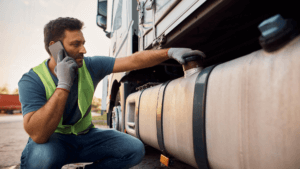Owning a trailer opens up a world of adventure, allowing you to explore the great outdoors with all the comforts of home. However, the journey can come to a sudden halt when you encounter unexpected issues on the road. Understanding the basics of trailer repair and knowing how to address common trailer problems can save you time, money, and stress.
Identifying Common Trailer Problems
Electrical System Failures
Electrical system failures in trailers can stem from a variety of issues. The most frequent culprits include corroded connectors, damaged wiring, or blown fuses. These problems can lead to non-functioning lights, ineffective brakes, or faulty appliances, significantly hampering your travel plans. To diagnose these trailer issues, start by inspecting your trailer’s wiring for visible damage or wear. Ensure that all connections are secure and free from corrosion. Testing fuses with a multimeter can help determine if they need replacing.
For DIY trailer fixes, keep a toolkit with spare fuses, electrical tape, and basic tools handy. Regular trailer maintenance, including cleaning and inspecting electrical components, will reduce the likelihood of encountering these problems on the road. Understanding how to repair trailer electrical issues will ensure your trailer remains safe and functional, providing peace of mind on any adventure.
Elluminate saves you time and money to keep you moving, contact us today.
Brake and Wheel Issues
Brake and wheel issues are among the most critical common trailer problems that need immediate attention. Worn-out brake pads, malfunctioning brake controllers, or warped rotors can compromise your trailer’s ability to stop effectively, posing serious safety risks. Regularly inspect your brake pads for wear and replace them if they are thinning. Ensure that the brake controller is functioning correctly and is appropriately calibrated.
Wheel issues, such as improper alignment or damaged bearings, can lead to uneven tire wear and reduced stability. To identify these problems, look for signs of uneven tire tread, listen for unusual noises while driving, and check for excessive heat around the wheel hubs. Performing routine trailer maintenance, such as greasing wheel bearings and ensuring correct tire pressure, can prevent these issues. Knowing how to repair trailer brakes and wheels will keep your trailer safe and ready for your next adventure.
We recommend you to see this article: Essential Maintenance Tips Every Truck Owner Should Know
Structural Damage and Wear
Structural damage and wear can severely impact your trailer’s longevity and safety. Common signs of structural issues include cracks in the frame, rust, and sagging floors. Such problems often result from prolonged exposure to harsh weather conditions, overloading, or poor maintenance. To identify structural damage, conduct regular inspections of your trailer’s frame, paying close attention to welds and joints. Look for any signs of rust or corrosion, especially around the undercarriage.
Use a flashlight to check the floor for any signs of sagging or water damage. Addressing these problems early can prevent costly repairs down the line. Simple DIY trailer fixes like rust treatment, reinforcing weak spots, and resealing leaks can extend your trailer’s lifespan. For more severe damage, consult a professional. Regular trailer maintenance, including cleaning and protective coatings, can mitigate structural wear and ensure your trailer remains roadworthy.
Time for maintenance? Contact Elluminate Service now.
DIY Trailer Fixes
Repairing Electrical Systems
Repairing electrical systems in your trailer can often be managed with some basic tools and knowledge. Start by diagnosing the issue: check for loose or corroded connections, damaged wires, and blown fuses. Use a multimeter to test electrical continuity and identify faulty components. Once identified, replace any blown fuses with ones of the same amperage.
For damaged wires, use a wire stripper to remove the damaged section, then splice the wire back together using connectors and electrical tape. Corroded connectors should be cleaned with a wire brush or replaced if necessary. Always ensure the power is off before working on any electrical components to avoid shocks.
Regular trailer maintenance, including checking all lights and brake systems before trips, can help prevent electrical failures. By knowing how to repair trailer electrical systems, you ensure that your trailer remains fully functional and safe for your travels.
We recommend you to see this article: The Role of Technology in Modern Truck Repair Services
Fixing Brake and Wheel Problems
Fixing brake and wheel problems on your trailer is essential for maintaining safe travels. Begin by inspecting the brake pads for wear. If they appear thin, replace them promptly to ensure effective braking. Check the brake controller settings to make sure they are correctly calibrated for your trailer’s weight. For wheel issues, regularly inspect the tires for uneven wear, which could indicate alignment problems or faulty bearings.
To replace wheel bearings, remove the wheel and brake assembly, clean the hub, and install new bearings using high-temperature grease. Ensure that all lug nuts are tightened to the manufacturer’s specifications to prevent wheel detachment.
Regularly check tire pressure and adjust according to the trailer’s load to avoid blowouts. By performing these routine trailer maintenance tasks, you can prevent common trailer problems and ensure a smoother, safer journey. Understanding how to repair trailer brakes and wheels is key to long-lasting performance.
Whether you need truck or trailer repairs, our knowledgeable staff is here to make the process as hassle-free as posible, contact us now!
Addressing Structural Damage
Addressing structural damage in your trailer is crucial to maintaining its integrity and safety. Start by thoroughly inspecting the frame for cracks, rust, and any signs of weakening, especially around welds and joints. For minor cracks, you can use a metal patch kit to reinforce the damaged area. Clean the surface, apply the patch, and secure it with epoxy or welding, depending on the severity. Rust removal is another essential step; use a wire brush to scrape off rust and apply a rust converter to prevent further corrosion.
For sagging floors, identify the cause—often water damage—and replace any compromised sections of the flooring. Use marine-grade plywood for a durable repair. Seal all joints and seams to prevent future water ingress. Regular trailer maintenance, such as applying protective coatings and keeping the trailer clean, can significantly reduce structural wear and tear. By knowing how to repair trailer structural damage, you ensure a safer and more reliable trailer.
We recommend you to see this article: Emergency Repairs: How We Get Trucks Back on the Road Quickly
Preventative Trailer Maintenance
Preventative trailer maintenance is key to avoiding costly repairs and ensuring your trailer remains in top condition. Start with regular inspections, checking for common trailer problems like wear and tear on tires, brakes, and electrical systems. Consistently monitor tire pressure and tread depth to prevent blowouts and ensure smooth towing.
Lubricate moving parts, such as wheel bearings and hitch components, to reduce friction and wear. Inspect and clean electrical connections to prevent corrosion that can lead to failures. Keep the trailer’s exterior clean and apply protective coatings to guard against rust and weather damage. Regularly examine the structural integrity of the frame, floors, and joints, addressing any minor issues before they escalate.
Schedule periodic professional inspections to catch problems you might miss. By incorporating these trailer maintenance routines, you not only extend the life of your trailer but also enhance safety and performance on every adventure. Understanding how to repair trailer issues begins with prevention.
For more tips and info, follow us on Facebook and Instagram. Call us for truck repair road service on: elluminatemobiletruckrepair.com






